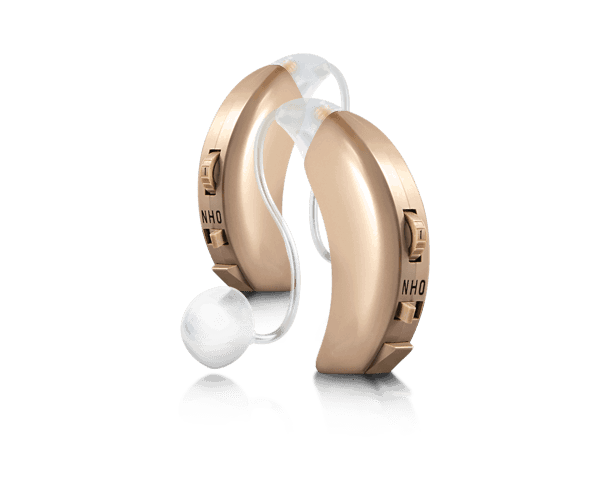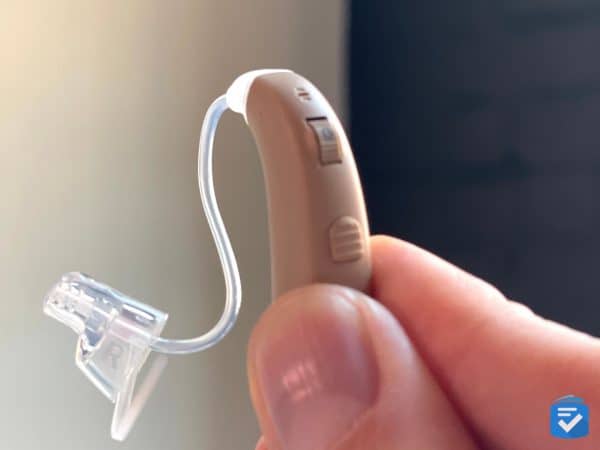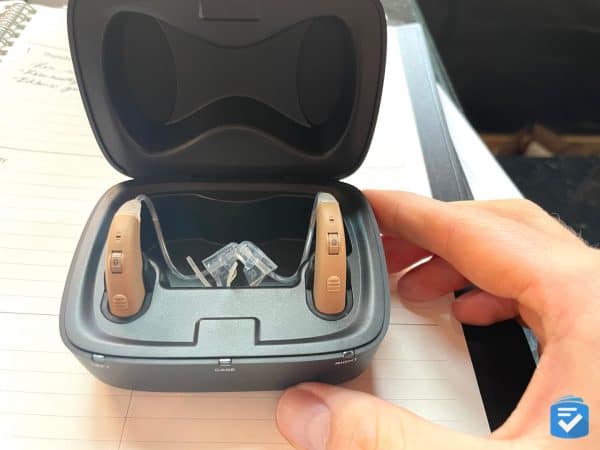
MDHearing: Hearing Aid Reviews


MDHearing devices provide a budget-conscious solution for individuals experiencing mild-to-moderate hearing loss, serving as an economical alternative to traditional hearing aids.
Compared to conventional hearing aids, which often exceed $4,000, MDHearing provides affordable options, with pairs starting at $297.
Though MDHearing devices may not include some advanced features like Bluetooth streaming, they deliver dependable performance and effectively assist those with mild-to-moderate hearing loss at a more accessible price point.


Let’s take a closer look at MDHearing models, their warranties, and other features that make them stand out among hearing aid competitors.
MDHearing Pros
- Affordable medical-grade devices: MDHearing delivers FDA-registered hearing aids at budget-friendly prices, offering superior functionality compared to basic sound amplifiers found in drugstores and online marketplaces.
- Smartphone capability: MDHearing’s latest models can pair with a smartphone app, allowing you to adjust them through your phone.
- Fully online: The entire process, from initial hearing assessment to purchasing, can be completed online, eliminating the need for in-person audiologist visits.
- 24/7 customer support: With the understanding that adapting to hearing aids takes time, MDHearing provides round-the-clock access to support professionals for technical assistance and troubleshooting.
- 45-day trials: Each hearing aid purchase includes a comprehensive 45-day trial period with a money-back guarantee if you're not satisfied.
MDHearing Cons
- No custom fits: While online purchases allow you to quickly and easily obtain hearing aids, they don’t give you the precise fit and customization that you’d have when purchasing Phonak hearing aids or Oticon hearing aids from a hearing health provider.
- Few high-tech features: While MDHearing offers rechargeable hearing aids and Bluetooth hearing aids, they don’t have advanced features such as artificial intelligence, automatic adjustments, and binaural processing.
FYI: If you’re looking to purchase a new pair of hearing aids, be sure to check out our guides to this year’s best hearing aids and best cheap hearing aids.
Purchasing MDHearing Devices
MDHearing operates exclusively through their website, where you can explore their complete product line and detailed feature specifications. While these FDA-registered devices meet medical standards, they're available without a prescription.
This ensures that you receive quality hearing assistance. Individuals with severe hearing loss, however, should consider consulting an audiologist for precisely calibrated devices suited to their specific hearing profile. For payment flexibility, MDHearing provides financing through Affirm, with 12-month payment plans beginning at $50 monthly, including options with 0 percent APR.
Did You Know: Does insurance cover hearing aids? In some cases, the answer is yes. Luckily, MDHearing now has an in-house insurance team that will help you navigate your coverage and even file a claim for you.
MDHearing Online Hearing Test
On MDHearing’s website, you’ll also be able to take their free hearing test. This process, which takes a matter of minutes, consists of some questions and sound recognition exercises. If you’ve ever visited a hearing health provider, this test will feel familiar. After you complete the test, the website will suggest which MDHearing model will be right for you.

MD Hearing Aid Models
Currently, MDHearing offers six models: AIR, NEO, NEO XS, NEO XS PRO, VOLT, and VOLT MAX. All of these models come with a 45-day trial period and a minimum one-year warranty.
Did You Know: To learn more about the different styles of hearing aids, read our hearing aid buying guide.
MDHearing AIR
The AIR serves as a basic digital hearing solution featuring essential noise management and feedback prevention technology. With dual microphone capability and four environmental presets, it handles typical listening situations effectively. The device lacks smart features like phone connectivity but provides sufficient sound enhancement for those with mild-to-moderate hearing difficulties.
Users can select from four distinct audio environments using the rear-mounted controls. It runs on rechargeable batteries and includes straightforward volume adjustment. Its user-friendly design suits those preferring simple operations, though users requiring extensive customization may find its options limiting.
MDHearing NEO
Representing a technological advancement in MDHearing's lineup, the NEO combines digital audio processing in a compact design. This rechargeable hearing aid incorporates systems for minimizing background noise and eliminating feedback. Unlike its siblings in the product line, the NEO features a single environmental setting. The device effectively supports mild-to-moderate hearing loss cases, delivering contemporary features at a competitive price. Its discreet design ensures minimal visibility during wear.
MDHearing NEO XS
The NEO XS represents a more compact iteration of the NEO, emphasizing discretion without compromising essential features. While maintaining similar digital processing capabilities as its predecessor, this miniaturized version adds four environmental presets and superior feedback management.
MDHearing NEO XS PRO
The XS PRO elevates the NEO XS design with refined signal processing and superior noise reduction technology. This premium device incorporates enhanced directional microphones and more advanced environmental adjustments. A key distinguishing feature is its smartphone app compatibility, allowing users to make adjustments remotely rather than physically manipulating the device.
MDHearing VOLT
The VOLT features a traditional behind-the-ear design with comprehensive amplification capabilities. Its larger construction houses more robust components suitable for mild-to-moderate hearing impairment. Users benefit from 20-hour operation between charges and intuitive controls. Superior feedback suppression allows for increased volume without unwanted noise. Although it doesn't include all the advanced features of the MAX version, it offers consistent performance and robust construction. The generously sized controls particularly benefit users with limited manual dexterity.
To learn about our experience with this specific model, read our full MDHearing VOLT review.
MDHearing VOLT MAX
As MDHearing's premium offering, the VOLT MAX combines powerful performance with sophisticated features for mild-to-moderate hearing loss. It includes advanced directional adaptation and noise control systems. Users can access multiple specialized environmental programs and benefit from enhanced feedback prevention at higher volumes. The integrated smartphone connectivity enables precise adjustments and monitoring. While its size exceeds some other models, this accommodates powerful internal components and accessible controls. It's ideally suited for those needing substantial amplification while maintaining audio clarity.
To learn more about these features, check out our full rundown of MDHearing costs.
FYI: If you want to skip the audiology visit, then check out our rundown of the best over-the-counter hearing aids.
MDHearing VIP Care
If you purchase either VOLT MAX or NEO XS PRO hearing aids, you have the option of paying an additional $200 for VIP Care. This package extends the one-year warranty to two years, gives you priority access to the customer care hotline, and gives you a one-on-one remote fitting from a licensed hearing professional.
In our experience, this package is definitely worth it. Since everyone’s hearing loss is different, it’s always helpful to have a hearing health professional assist in adjusting your devices.

MDHearing Warranty and Return Policy
MDHearing provides a one-year limited warranty on all devices, starting from the delivery date. This warranty covers defects in materials and workmanship, with MDHearing offering free repairs or replacement for qualifying issues.
The standard warranty has specific exclusions. It doesn't cover damage from unusual wear and tear, physical impacts, moisture exposure, sweat damage, excessive earwax accumulation, or device tampering. Regular maintenance is mandatory to keep the warranty valid; users must routinely replace accessories like domes, tips, wax guards, and tubing.
MDHearing Protection Plan
During the checkout process, you’ll also have the option to purchase a protection plan from MDHearing. This plan costs us $19.99 per month and includes coverage in the event that you lose your hearing aids. If you want basic protection, which just covers accidental damage, then this will cost $12 per month.
Bottom Line
Between their interest-free financing and already competitive prices, it’s hard to think of a better affordable hearing aid than one from MDHearingAid. While their devices lack some of the fine-tuning available on traditional hearing aids, MDHearing Aid products may offer an ideal budget-friendly solution for those with mild to moderate hearing loss.
If, however, you have a more severe form of hearing loss, you should check out our list of hearing aids for severe hearing loss. Additionally, be sure to check out our other hearing guides:
MDHearing Frequently Asked Questions
-
Is MDHearing a reputable company?
In our experience, MDHearing is highly reputable. Their customer service is great, and their devices work very well for those with mild to moderate hearing loss.
-
Who makes MD Hearing?
MDHearing is a private company that manufactures its hearing devices in Michigan. Although they’ve only been around for about a decade, they’re quickly becoming a popular option for affordable hearing aids.
-
How long do MDHearing batteries last?
MDHearing’s rechargeable batteries will last 15 to 20 hours per charge, depending on the model.
-
Is MDHearing a PSAP?
No, MDHearing’s devices are FDA-registered Class I hearing devices, meaning they have a higher degree of frequency shaping than PSAP’s, which you can often find on eBay or Amazon.
-
What is the difference between an amplifier and a hearing aid?
Amplifiers simply make all noises louder for a user, whereas hearing aids will target specific frequencies, block out certain noises, and offer a higher degree of precision and customization overall.

